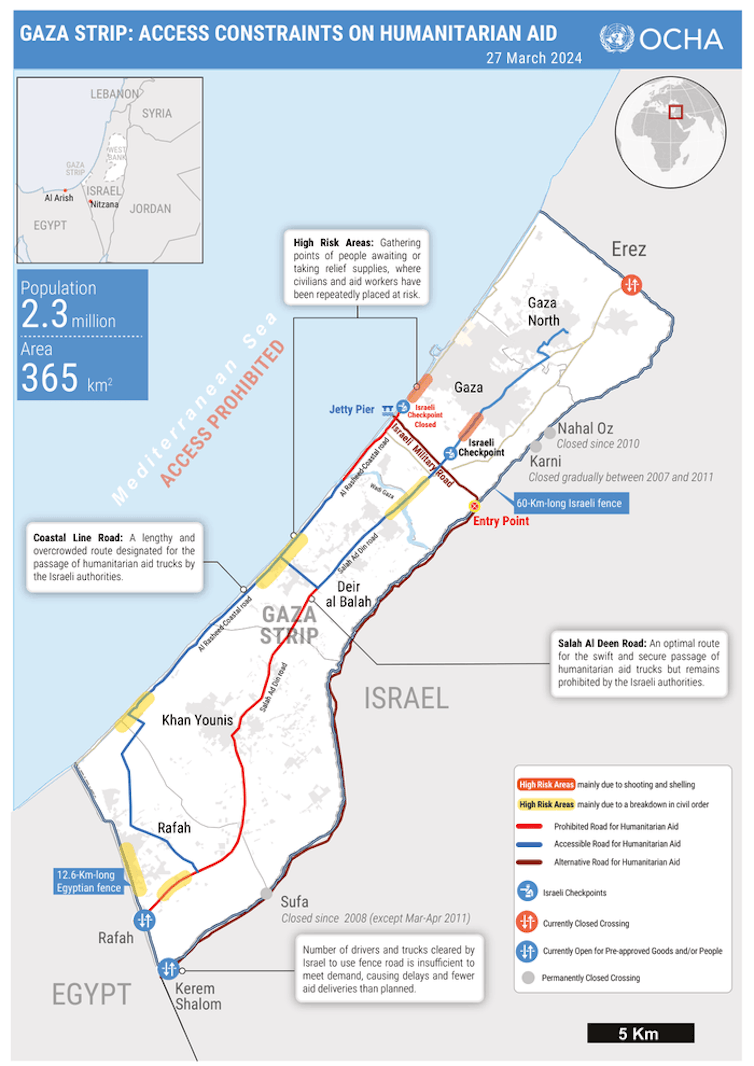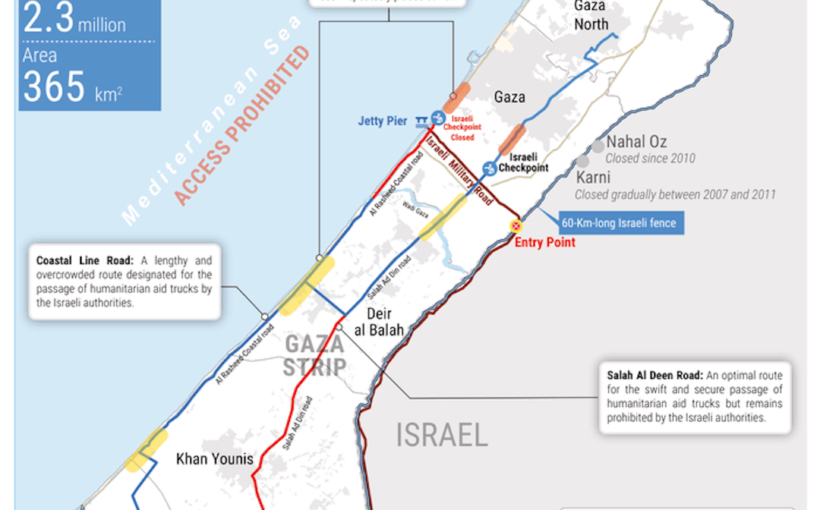The missiles that struck the World Central Kitchen (WCK) aid convoy this week, killing seven aid workers, including three Britons, were likely to have been “absolutely perfectly accurate” Spike missiles. This from a former British army procurement officer quoted in The Times. “If you aim at the driver’s side, you will hit the driver full-on,” Chris Lincoln-Jones told the newspaper. “If you were across the street from the car, you’d be shaken up and you might be hit by a few splinters, but you would survive.”
Israel has denied targeting the three WCK vehicles, with economy minister Nir Barkat saying Israel was “terribly sorry” about killing the WCK workers but that “unfortunately, in wars friendly fire happens”.
If Lincoln-Jones is correct – and several other press sources have suggested the same – these Spike missiles are produced by Israeli arms manufacturer Rafael, which has sold tens of thousands of them around the world. It is also thought probable that they were launched from a Hermes drone, made by Elbit Systems – also an Israeli manufacturer.
This is important, because one key focus of the story is fast becoming the legal status of those countries which have been selling arms to Israel. A letter to the UK prime minister, Rishi Sunak, signed by more than 600 UK lawyers and academics, including three former supreme court justices – among them Baroness Hale, the court’s former president – as well as more than 60 KCs, was revealed in The Guardian this morning. The letter, which the newspaper reports amounts to a legal opinion, says UK arms sales to Israel breach international law and must stop.
Lawrence Hill-Cawthorne, an expert in international law at the University of Bristol, writes here that the UK government had received legal advice that Israel was breaking international humanitarian law in Gaza but had not revealed this. He runs us through Israel’s (and everyone else’s) obligations under various international treaties.
The key factor, Hill-Cawthorne adds, is that under the Geneva Conventions, states are obliged to do what they can to prevent violations of international humanitarian law – including taking proactive steps to ensure that warring countries comply with their obligations under international law. One obvious way to do that is to stop selling them weapons.
More than 200 aid workers have been killed since Israel launched its assault on the Gaza Strip in October. It is, write Foteini Stavropoulou of Liverpool John Moores University and Sarah Schiffling of Hanken School of Economics – both experts in humanitarian aid distribution – the most dangerous place in the world to be an aid worker, despite the fact that humanitarian personnel are protected under the fourth Geneva convention.
The seven WCK workers had taken a precaution that is commonly used by humanitarian workers in conflict zones, a mechanism known as “deconfliction”. This is when organisations provide armed forces with location details and movement plans of workers, as well as real-time communication during humanitarian operations to ensure their safety. It has been reported that WCK had provided the Israel Defense Forces (IDF) with their movements, including having their route through the Gaza Strip pre-approved.

Now many of the aid agencies operating in Gaza have suspended their activities. As Stavropoulou and Schiffling write here, the difficulty of getting aid to the population threatens to make the famine that is engulfing the Gaza Strip worse than it already is.
UN resolution
The hope is, of course, that Israel will heed the recent UN security council resolution calling for an immediate ceasefire and for Israel to do everything it can to ensure aid is getting to the people of Gaza, while enjoining Hamas to release the Israeli hostages they hold as part of the deal. But this remains an unlikely prospect given statements by the Israeli prime minister, Benjamin Netanyahu, that the IDF is poised to enter the city of Rafah, where more than a million displaced Palestinians are still sheltering.
We spoke with John Strawson, an expert in Israeli politics at the University of East London, who kindly answered our questions about the politics of the situation, especially the US decision not to use its veto to block the resolution after decades of faithfully supporting successive Israeli governments in the security council. Given the febrile and chaotic state of Israeli politics at present, Strawson believes, the clear signs of US disenchantment with Netanyahu will have contenders jockeying for position. And in fact Benny Gantz, one of Netanyahu’s biggest rivals and a member of his war cabinet, has already called for an election to “prevent a rift in the nation”.
Given that Netanyahu has indicated that Israel will not abide by security council resolution 2728 – and the US has said that it’s a non-binding resolution in any case – what does international law say about the enforceability of US resolutions? Amanda Cahill-Ripley, a specialist in international human rights law at the University of Liverpool, explains the legal background – which goes back to when the UN ordered apartheid-era South Africa to quit its colonial possession in South West Africa which then eventually became the state of Namibia.
There appears no reason why resolution 2728 is not legally binding and, if push comes to shove, the security council could order that UN members “take such action by air, sea, or land forces as may be necessary to maintain or restore international peace and security”. But as Cahill-Ripley concludes, what happens next is as much a matter of political will as international law.
Starvation behind the ‘Iron Wall’
Meanwhile the casualty count continues inexorably to rise. According to the Hamas-run Gaza health ministry the total has now passed 33,000 people. Famine is imminent – in fact the US state department believes that it may already be taking hold in the north of Gaza, where aid agencies have found it nigh on impossible to reach people. A recent report from the Integrated Food Security Phase Classification (IPC) – a multi-agency initiative for analysing and preventing food insecurity – has laid out the bleak picture across the Strip where many people now live in “IPC Phase 5 (Catastrophe)”.
Nnenna Awah, whose PhD research at Sheffield Hallam University is in optimising food supply chains, walks us through the different classifications of food insecurity. There is no good news, she writes. The entire Gaza Strip is now living in a state of acute food insecurity. But in the north, according to Oxfam, people are surviving on an average of 245 calories a day – about what you’d get from a tin of beans.
If you wonder at the severity of Israel’s assault on Hamas in Gaza, which – don’t forget – is still supported by about 60% of the Israeli public, no matter how unpopular Netanyahu might be, then this piece by Eran Kaplan, the Rhoda and Richard Goldman Chair in Jewish Studies at San Francisco State University, is well worth a read.
Kaplan says it is the embodiment of Israel’s “Iron Wall” ideology, developed even before statehood was declared in 1948. It dates back to an article written in 1928 by Zionist activist Vladimir Jabotinsky, “On the Iron Wall”, in which he expresses his belief that the Arab population of Palestine (as it was under the British Mandate) would never accept a Jewish state. He wrote:
Zionist colonisation…can proceed and develop only under the protection of a power that is independent of the native population – behind an iron wall, which the native population cannot breach.
Kaplan says that Jabotinsky’s ideological heirs in Likud (including Netanyahu) have rejected more liberal Israeli compromise positions ever since. Given they face an enemy in Hamas that is equally unbending in its refusal to accept a Jewish homeland, there is little prospect for a peaceful solution without a significant generational change.
![]()



